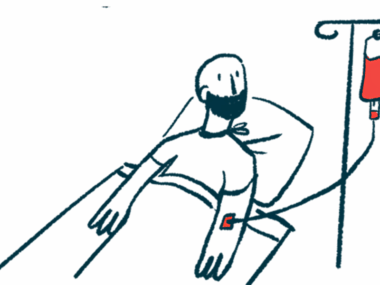MGFA Session 2025: Vyvgart eases seronegative gMG disease severity
Benefits seen across various subgroups of anti-AChR antibody-negative patients
Written by |

Vyvgart (efgartigimod alfa-fcab) led to significant and clinically meaningful reductions in disease severity among adults with generalized myasthenia gravis (gMG) who test negative for disease-causing antibodies targeting the acetylcholine receptor (AChR).
Notably, benefits were seen across different subgroups of anti-AChR antibody-negative patients, who are also known as having seronegative gMG.
That’s according to new data from the Phase 3 ADAPT SERON clinical trial (NCT06298552) that were presented during the Myasthenia Gravis Foundation of America (MGFA) scientific session at the American Association of Neuromuscular & Electrodiagnostic Medicine (AANEM) annual meeting, held yesterday in San Francisco.
James F. Howard, Jr., MD, ADAPT SERON’s principal investigator and a neurologist at the University of North Carolina School of Medicine, presented the talk, which was titled “Phase 3 Trial Investigating Impact of Intravenous Efgartigimod in Anti-Acetylcholine Receptor Antibody-Negative Generalized Myasthenia Gravis.”
Vyvgart’s U.S. approval limited to adults positive for anti-AChR antibodies
Vyvgart’s approval in the U.S. is currently limited to adults who test positive for anti-AChR antibodies, the most common cause of gMG. Vyvgart’s developer, Argenx, plans to use these positive trial data to seek a label expansion that will include seronegative gMG patients.
“Our latest data reflect Argenx’ ambition to deliver transformational impact for all people living with MG globally with rapid and significant functional improvements sustained over time, regardless of MG disease subtype,” Luc Truyen, MD, PhD, Argenx’s chief medical officer, said in a company press release.
Howard echoed those comments in the press release.
“The ADAPT SERON trial showed that [Vyvgart] generated tangible improvements in daily functioning, marking an important advancement for the field and for seronegative patients seeking better disease control,” he said.
In gMG, the immune system produces self-reactive antibodies that attack proteins necessary for proper nerve-muscle communication, leading to symptoms of muscle weakness and fatigue. In the majority of cases (80% to 85%), AChRs are the target of these attacks.
The remaining 15% to 20% of patients test negative for anti-AChR antibodies. In some of these cases, disease-causing antibodies instead target the MuSK or LRP4 proteins. If commercial tests don’t identify a disease-causing antibody, patients are said to have triple-negative gM,
During the talk, Howard noted that there are a number of possible reasons why such antibodies wouldn’t be detected, but it doesn’t necessarily mean they are not there.
Seronegative gMG can be more difficult to diagnose, and patients have fewer treatment options than their seropositive counterparts.
“The seronegative patient is a very difficult population for we as clinicians to treat,” Howard said. “It’s a population that we’ve neglected for decades in all of our clinical trials.”
Studies explore use of Vyvgart in wider range of gMG patients
Vyvgart works to accelerate the breakdown of disease-driving antibodies by blocking FcRn, a protein that helps prevent the destruction of circulating antibodies. It’s given via weekly infusions into the bloodstream (10 mg/kg) in four-week cycles.
Argenx is running a number of studies seeking to explore Vyvgart’s use in a wider range of gMG patients beyond adults with AChR-related gMG. ADAPT SERON was designed to evaluate Vyvagart’s safety and efficacy in adults with seronegative gMG who are on stable background therapy.
The study enrolled 119 adults, who were randomly assigned to a four-week cycle of Vyvgart or a placebo. In a subsequent open-label extension (OLE) period, all participants are receiving two cycles of Vyvgart, four weeks apart, followed by additional cycles as clinically indicated.
The trial’s main goal was to evaluate changes after the first month in MG Activities of Daily Living, a standard patient-reported measure that assesses how the disease affects daily life. Higher scores indicate a greater impact, and a score reduction of at least two points is considered clinically meaningful.
As previously reported, the study achieved its main goal, with Vyvgart leading to statistically significant and clinically meaningful improvements in MG-ADL scores compared with the placebo.
Across the entire study group, MG-ADL scores dropped from the study’s start, or baseline, by a mean of 3.35 points in the Vyvgart group — a significant, 1.46-point improvement over the placebo.
Similar clinically meaningful improvements were observed across anti-MuSK, anti-LRP4, and triple-negative patient subgroups.
Differences relative to the placebo reached statistical significance only among patients positive for anti-MuSK antibodies, who experienced the largest MG-ADL score drop with Vyvgart, by 4.24 points. Notably, all six participants with anti-LRP4 antibodies received Vyvgart, meaning there was no placebo control group to compare.
Additional improvements seen in open-label extension period
Importantly, additional improvements were observed with subsequent treatment cycles in the OLE period across the entire study group and in all patient subgroups.
“As we move into subsequent cycles … one sees further improvement … – a cumulative effect if you will,” Howard said.
A similar pattern of improvements was observed with the Quantitative MG scale, a clinician-rated measure of disease severity.
Collectively, these findings highlight that [Vyvgart] has the potential to deliver meaningful and progressive benefits for patients regardless of antibody status, with its therapeutic impact strengthening through continued treatmen.
Vyvgart had a safety profile consistent with what has been seen in anti-AChR-positive patients. One death during the OLE portion was deemed potentially related to Vyvgart, “but we don’t have additional data,” Howard said.
“Collectively, these findings highlight that [Vyvgart] has the potential to deliver meaningful and progressive benefits for patients regardless of antibody status, with its therapeutic impact strengthening through continued treatment,” Howard said.
The neurologist also believes the data demonstrate that harmful self-reactive antibodies “may be an important driver across all patient subtypes,” regardless of whether a person has tested positive for known antibody types.
Note: The Myasthenia Gravis News team is providing virtual coverage of Myasthenia Gravis Foundation of America’s scientific session at the American Association of Neuromuscular & Electrodiagnostic Medicine Annual Meeting Oct. 29. Go here to see the latest stories from the conference.





Leave a comment
Fill in the required fields to post. Your email address will not be published.